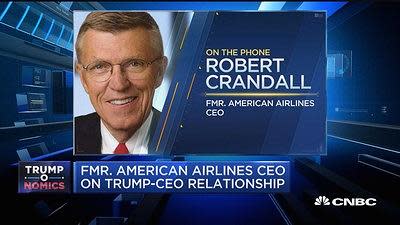3 ways Trump's GOP could be bad for US business

Corporate America just figured out that President Donald Trump 's all-Republican Washington may not be so good for business after all.
This week's trigger was the president's sympathy for participants in the "Unite the Right" rally that triggered deadly violence in Charlottesville, Virginia. For business leaders serving customers across America and the world, Trump's failure to unequivocally condemn an event involving white supremacists and neo-Nazis made the cost of associating with him unacceptably high.
Yet, that represented just the latest flashing red signal, even as investors and executives hope the White House and Congress can deliver a profit-enhancing combination of tax cuts and deregulation. The warnings come from three different directions.
The first worry: Economic policy
Trump reflects the decades-long surge of blue-collar populism within the GOP. That has so transformed the rank-and-file of both parties that, in an NBC News-Wall Street Journal poll this year, 53 percent of Republicans said free trade has hurt the U.S. while most Democrats said it has helped.
Trump mirrored that sentiment in ditching the Trans-Pacific Partnership, which the GOP-controlled Congress refused to ratify before President Barack Obama left office. And in a new interview this week, his chief White House strategist, Steve Bannon, vowed to be "maniacally focused on…the economic war with China."
A champion of "economic nationalism," Bannon spoke of battling rivals in the Treasury and White House such as National Economic Council director Gary Cohn. By backing cuts in legal as well as illegal immigration, Trump showed that his business-oriented advisors are losing some of those fights.
Earlier, business leaders blanched at Trump's abandonment of Obama's Paris climate accord. That decision, isolating the U.S. as global industries and governments shift planning toward new energy sources, led Tesla's Elon Musk and Disney's Bob Iger to quit White House advisory panels.
The second worry: GOP competence
This concern centers on Republicans' ability to competently run a government that so much of the party despises. It threatens their ability to deliver on areas of agreement with business.
The distance became most evident at peak financial danger in 2008, when two-thirds of House Republicans disregarded President George W. Bush and torpedoed the Wall Street bailout. A huge stock market drop later turned the necessary votes around.
Since recapturing the House in 2010, divided Republicans have consistently failed to reach compromises commensurate with their institutional power or public support. Corporate leaders were largely indifferent to this summer's Obamacare debate, since most have provided substantial health benefits for decades. Now Republican stumbles are casting a cloud over the upcoming tax reform challenge.
The party must reach a 2018 budget deal next month. Without one, Washington faces another government shutdown – four years after the last one that House Republicans triggered, over Obamacare.
Additionally, Congress also must raise the federal debt limit soon. In 2011, resistance by Tea Party-allied GOP members led to the nation's first-ever Standard & Poor's credit downgrade. The Trump administration has sent mixed messages on how to overcome that resistance now.
Chaos within the thinly staffed Trump administration raises doubt about its ability to execute promised deregulatory steps. And if some of those steps are implemented, Federal Reserve Vice Chairman Stanley Fischer warned recently, they risk a new financial crisis a decade after the last one.
"One cannot understand why grown intelligent people reach the conclusion that [you should] get rid of all the things you have put in place in the last 10 years," Fischer told the Financial Times.
The third worry: Values
The GOP's embrace of cultural conservatism conflicts with corporate America's embrace of diversity and tolerance.
So, when Vice President Mike Pence served as governor of Indiana, his same-sex marriage-inspired "Religious Freedom Restoration Act" provoked fierce business resistance. Last month, tech industry leaders joined top military commanders in defending transgender soldiers after Trump declared they could no longer serve.
Trump's comments on Charlottesville have not triggered mass defections from the president's base among older white voters without college degrees, or Republican lawmakers reliant on their votes. But corporate executives tend to respond more to younger, better-educated customers and peers.
That segment of the population loathes the president. In June's NBC/WSJ poll, just 20 percent of college-educated Americans under 45 approved of Trump's job performance; 76 percent disapproved.
A Korn-Ferry survey of top U.S. companies this year found the average age of CEOs at 58 years old. Nearly all their children go to college.
WATCH: Isaacson says Trump 'unhinged' to focus on Confederate statues
More From CNBC

